|
|
|
Sort Order |
|
|
|
Items / Page
|
|
|
|
|
|
|
| Srl | Item |
| 1 |
ID:
133275
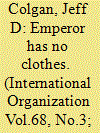

|
|
|
|
|
| Publication |
2014.
|
| Summary/Abstract |
Scholars have long debated the causal impact of international institutions such as the World Trade Organization or the International Monetary Fund. This study investigates Organization of Petroleum Exporting Countries (OPEC), an organization that purports to have significant influence over the market for the world's most important commodity-petroleum. Using four empirical tests, I find that OPEC has little or no impact on its members' production levels. These findings prompt the question of why so many people, including scholars, believe in OPEC's influence over the world's oil supply. The idea of OPEC as a cartel is a "rational myth" that supports the organization's true principal function, which is to generate political benefits for its members. One benefit it generates is international prestige. I test this idea using data on diplomatic representation and find that OPEC membership is associated with increased international recognition by other states. Overall, these findings help one to better understand international regimes and the process of ideational change in world politics.
|
|
|
|
|
|
|
|
|
|
|
|
|
|
|
|
| 2 |
ID:
165779
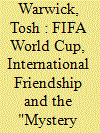

|
|
|
|
|
| Summary/Abstract |
Article Type: Research Paper Purpose:This article explores the evolution of international bonds between Middlesbrough in the northeast of England and North Korea arising from the participation of the North Korean men's football team at the 1966 FIFA World Cup. Shedding new light on the origins of this example of sporting diplomacy, this research seeks to understand the dynamics of international relations enacted at a local level and highlights the role of key individuals and institutions in facilitating this connection between the town and North Korea into the twenty-first century. Design, Methodology, Approach:Beginning with an assessment of early interactions between Middlesbrough and North Korea, this paper analyzes the way in which the relationship has been articulated and developed across several decades. Drawing upon local authority archives, historic newspaper collections, oral history and private collections, this study brings together hitherto underexplored resources, including North Korean diplomatic correspondence and interviews with the footballers of 1966, to deconstruct the multilayered mechanisms, meanings and motivations that underpin the Middlesbrough-Pyongyang relationship. Findings:Focusing chiefly on the role of British agency in North Korea-UK interactions, this research reveals the combination of local sporting conditions, international relations and individual and institution engagement in constructing bonds between Middlesbrough and North Korea since 1966. In doing so, the article draws out some of the peculiar local, economic and political factors that have shaped and nurtured the sporting, pseudodiplomatic connections between Pyongyang and Teesside. Practical Implications:This study highlights the important role that sport can play in harnessing new international interactions and understandings between peoples from different cultural and political systems. The power of football and bonds created at a local level (in this case Middlesbrough) to help nurture international diplomatic relations and embrace common transnational interests is also considered, as are the limitations of what might be considered a strand or extension of sports diplomacy. Originality, Value:Expanding beyond the existing literature on sports diplomacy, mega events and official interactions between North Korea and the UK, this article utilizes hitherto unpublished historical documentation and new oral testimony to bring a new perspective on the benefits and challenges posed by interactions across international borders facilitated by sport, both at the FIFA World Cup in 1966 and in recent decades.
|
|
|
|
|
|
|
|
|
|
|
|
|
|
|
|
| 3 |
ID:
155712
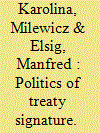

|
|
|
|
|
| Summary/Abstract |
The literature on international cooperation through legal commitments focuses chiefly on treaty ratification. What has received much less attention is that before states ratify treaties, they commit to treaties through the act of signature. This article addresses this research gap by investigating how a state’s decision to sign a treaty is affected by its diplomatic representation during treaty negotiations. Conceptualizing signature as a commitment step, we argue that participation in treaty negotiations translates into a “ties-that-bind” effect creating incentives for diplomats to support the treaty text leading to treaty signature. Our empirical analysis uses a new data set on signature and tests the argument for 52 multilateral treaties concluded between 1990 and 2005. Results confirm that participation in treaty making matters for signature but not necessarily for ratification.
|
|
|
|
|
|
|
|
|
|
|
|
|
|
|
|
| 4 |
ID:
190856
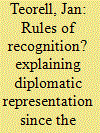

|
|
|
|
|
| Summary/Abstract |
The aim of this article is to explore the establishment of diplomatic representation as a measure of de facto recognition by other state units and to explain its causes in the “long 19th century” (1817–1914) and the post–World War II (WWII) era (1950–2000). Drawing on the Correlates of War diplomatic exchange data, the article explores the underlying drivers of dyadic acts of recognition in two series of logistic regression analyses, one for each time period. The results indicate that, also when taking alternative explanations into account, recognition of other states in the international system was in the 19th century at least based on one general principle: that of recognizing other de facto states. In the post-WWII era, contrary to expectations, this principle was still in effect. De facto statehood can thus be argued to constitute a rather stable norm for recognition in the international system.
|
|
|
|
|
|
|
|
|
|
|
|
|
|
|
|
| 5 |
ID:
107654
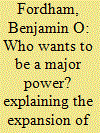

|
|
|
|
|
| Publication |
2011.
|
| Summary/Abstract |
Some states define their interests more broadly than others, looking beyond their immediate security and mobilizing their national wealth in pursuit of more ambitious goals. The most successful of these states come to be seen by others as major powers. Though major powers and states aspiring to attain this status are very important in world politics, relatively little explicit attention has been paid to the question of why some states expand their foreign policy ambitions, adopting what can be termed a major-power foreign policy. This article evaluates three explanations for this policy choice. Some international relations theory claims that potential power is itself a sufficient motivation for the adoption of major-power foreign policy. Other theorists suggest that some triggering condition is required, such as increasing international threat or expanding international economic interests. Evidence concerning the construction of military capabilities and diplomatic activism indicates that potential power alone does not offer a sufficient explanation for the adoption of major-power foreign policy. Both international threats and economic interests act as triggers for this choice, though they appear to push states toward different types of mobilization.
|
|
|
|
|
|
|
|
|
|
|
|
|
|
|
|
|
|
|
|
|